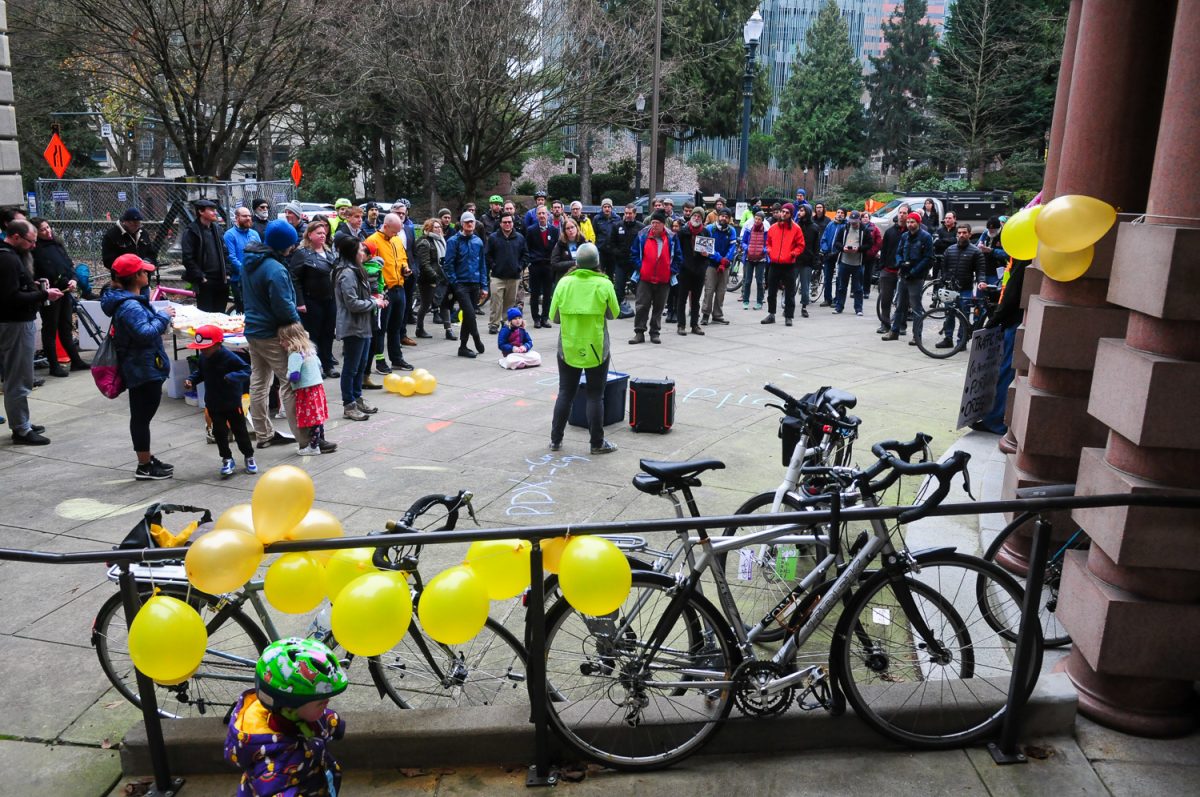
(Photos © J. Maus/BikePortland)
“We already have an excellent bike network in our city. The problem is there are simply too many people driving on it.”
— Catie Gould, Bike Loud PDX
With a mix of urgency and reflection, advocates, city staff, and a few politicians showed up at the plaza outside City Hall today to mark the 10th birthday of Portland’s Bicycle Plan for 2030.
To root the event in history, former bike plan project manager (now retired) Ellen Vanderslice read the vision statement from the plan’s introduction:
“It is the year 2030, and Portland looks much different than it did a generation ago. By sharply reducing reliance on personal auto use, Portland significantly lowered its carbon footprint, eased traffic congestion, improved air quality and enhanced public health. One of the community’s most valuable assets – the public right-of-way – was reclaimed for all Portland residents… Bicycling is now a fundamental pillar of Portland’s fully integrated transportation system, with more than a quarter of all daily trips taken by bicycle on the city’s world renowned bikeway network.”
If only! And we only have 10 years to get there.
That’s why Bike Loud PDX volunteers and partners organized today’s event. With cupcakes and a “Happy Birthday to you” serenade, they want to celebrate the plan, but also speed up its implementation.
Advertisement
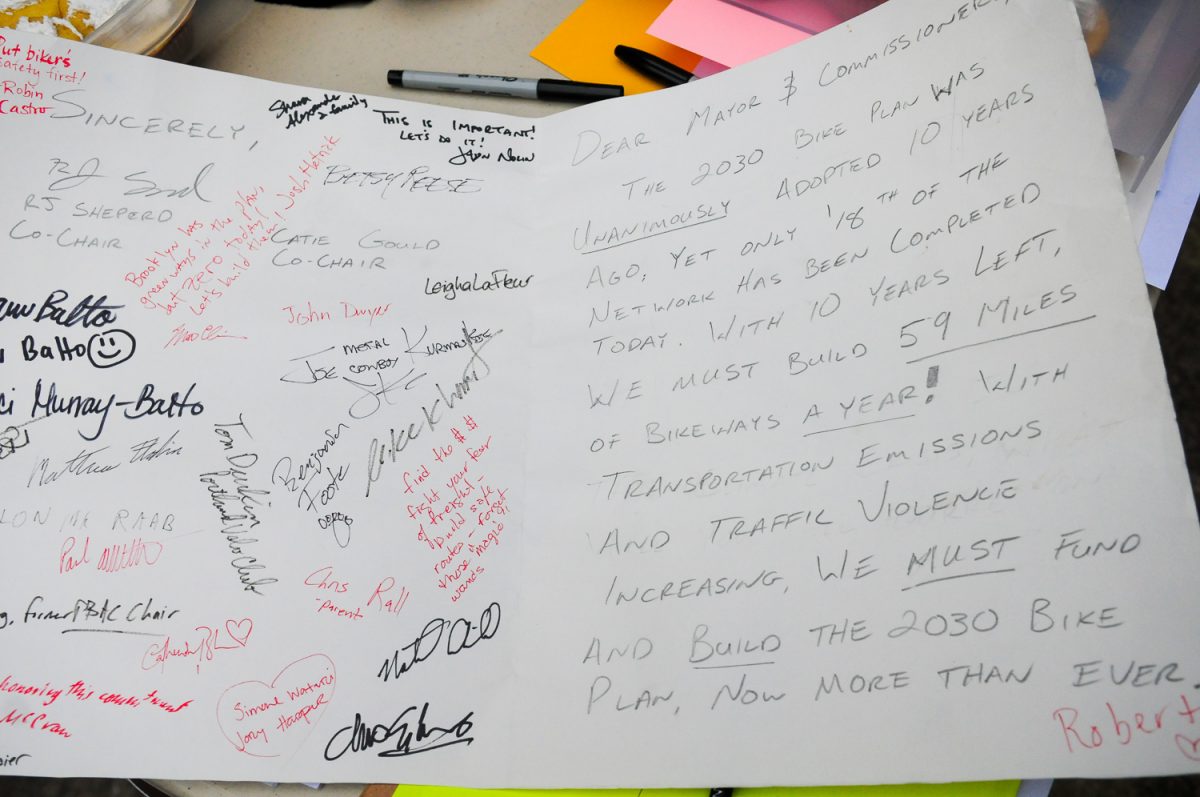
A crowd of about 100 people heard remarks by Vanderslice, Community Cycling Center Executive Director Kasandra Griffin, and Bike Loud PDX Co-Chair Catie Gould. In addition to advocates and bike supporters, notable faces in the crowd included: PBOT Commissioner Chloe Eudaly (who walked out from her office very briefly), PBOT Bicycle Coordinator Roger Geller, former Portland Mayor and city council candidate Sam Adams, city council candidate Keith Wilson, and mayoral candidate Sarah Iannarone.
Griffin said, “We appreciate the past, present and future electeds who value transportation justice, and we call on the mayor and city hall to put their money where their plans are.”
Gould reminded the crowd that the solution to Portland’s transportation problems are actually quite simple, but implementing it takes courage. “We already have an excellent bike network in our city,” she said, “the problem is there are simply too many people driving on it.”
Bike Loud wants the projects adopted in the bike lane to be implemented much quicker than they’ve been for the past 10 years. “Right now, city agencies are putting together budget proposals for next year. Right now campaigns are underway for the four out of five seats on city council are up for election this year. The 2030 Bike Plan will only be an issue if we make it one, and we will make sure that elected officials hear loud and clear that right now is the time to act!”
If you’d like to get plugged-into Bike Loud’s efforts, check out their website at 2030report.bikeloudpdx.org.
— Jonathan Maus: (503) 706-8804, @jonathan_maus on Twitter and jonathan@bikeportland.org
— Get our headlines delivered to your inbox.
— Support this independent community media outlet with a one-time contribution or monthly subscription.



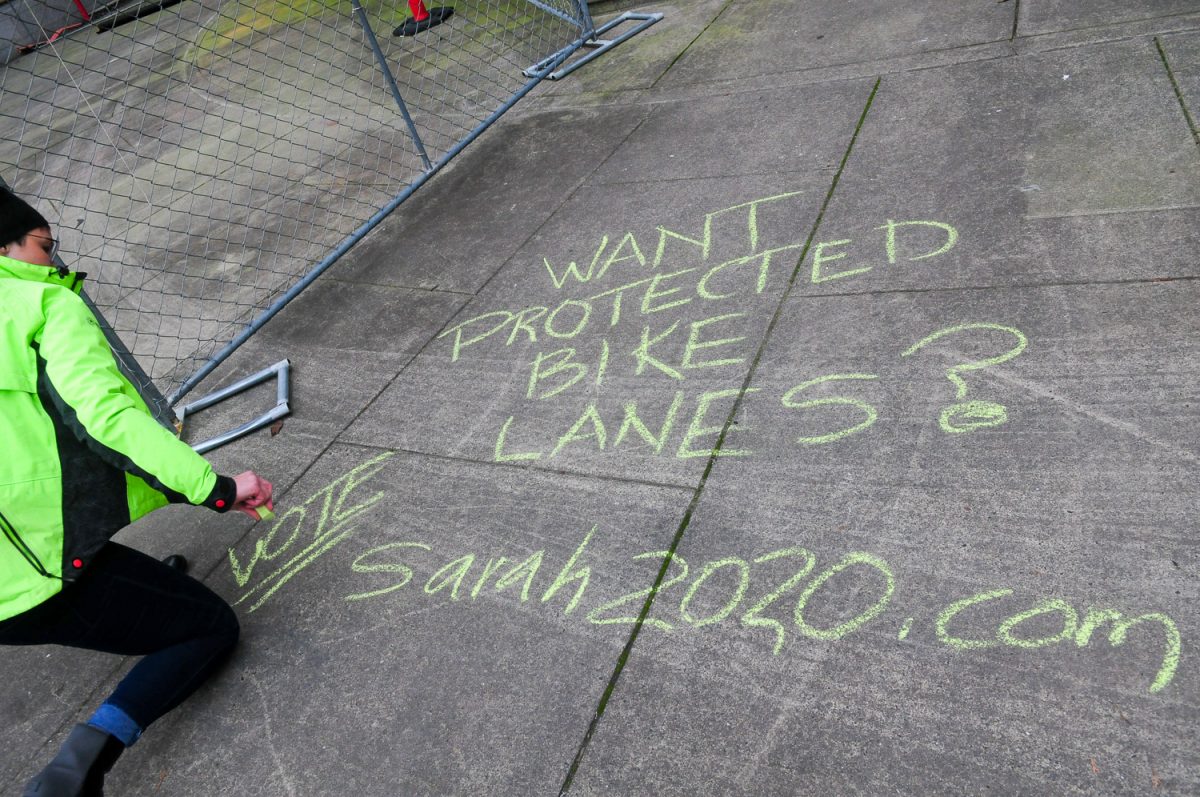
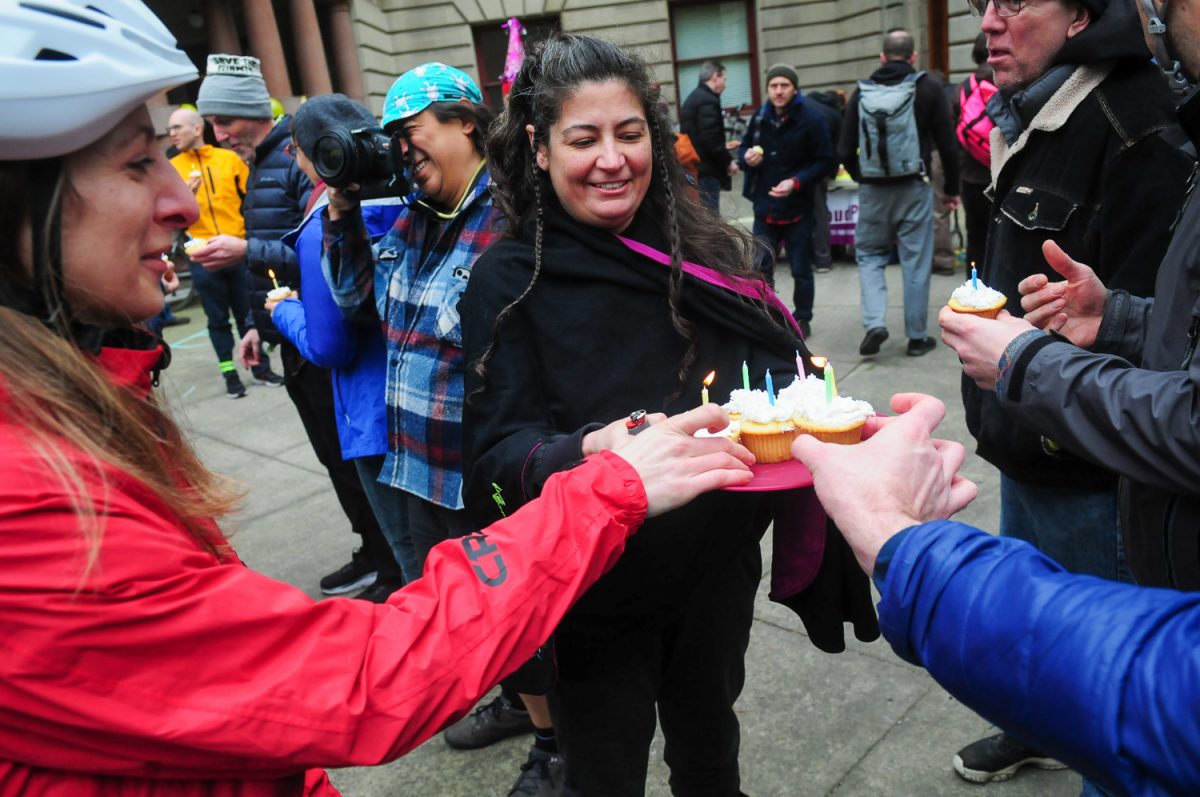


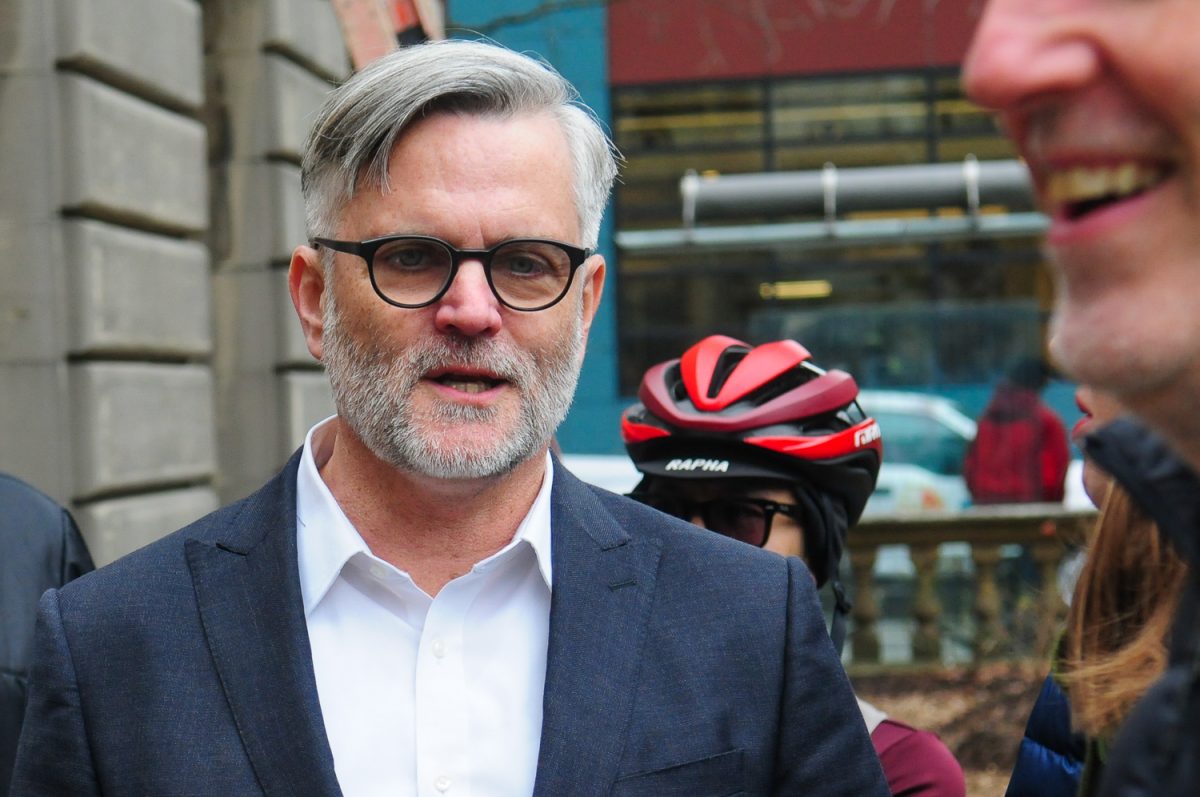
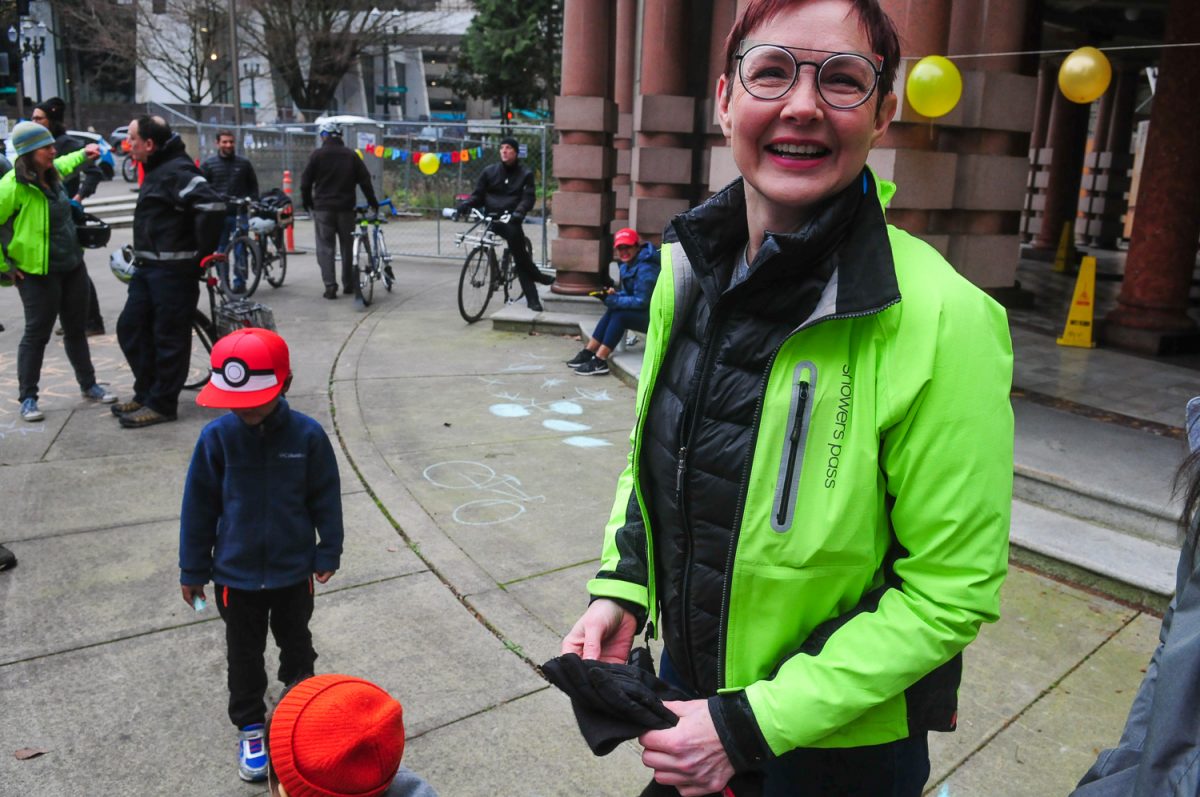
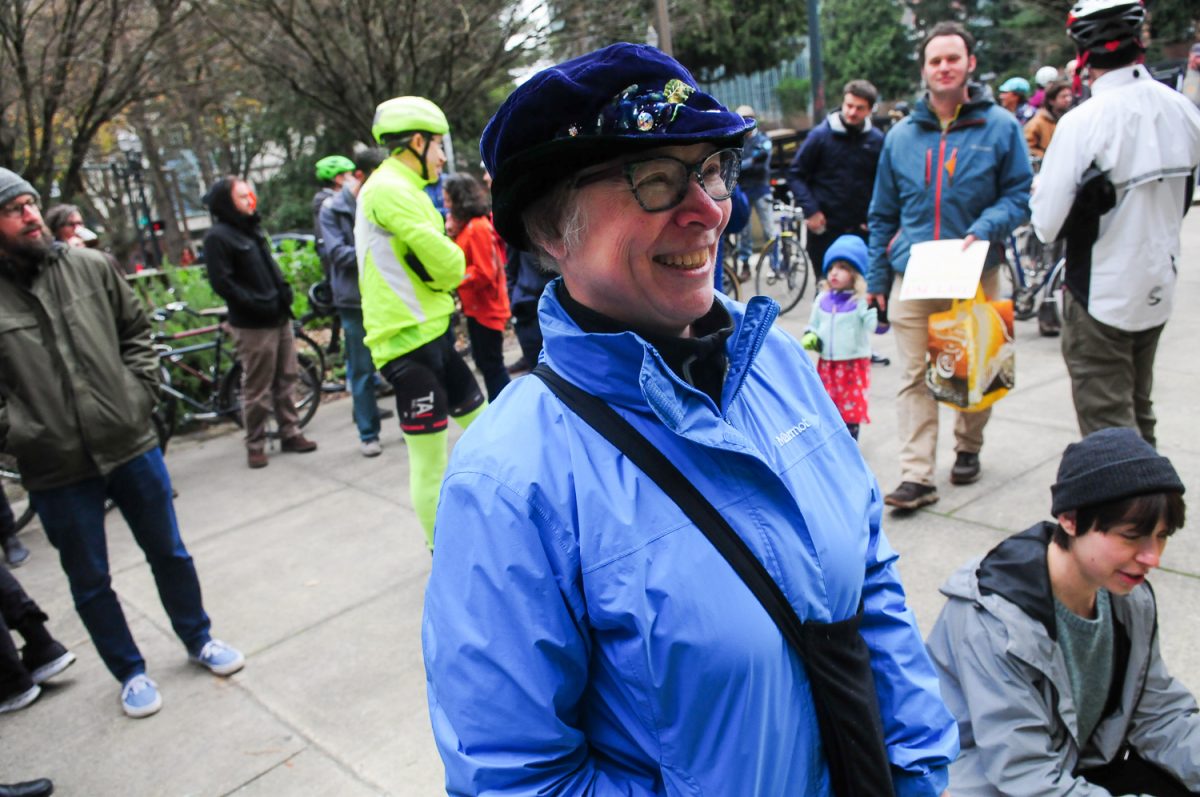
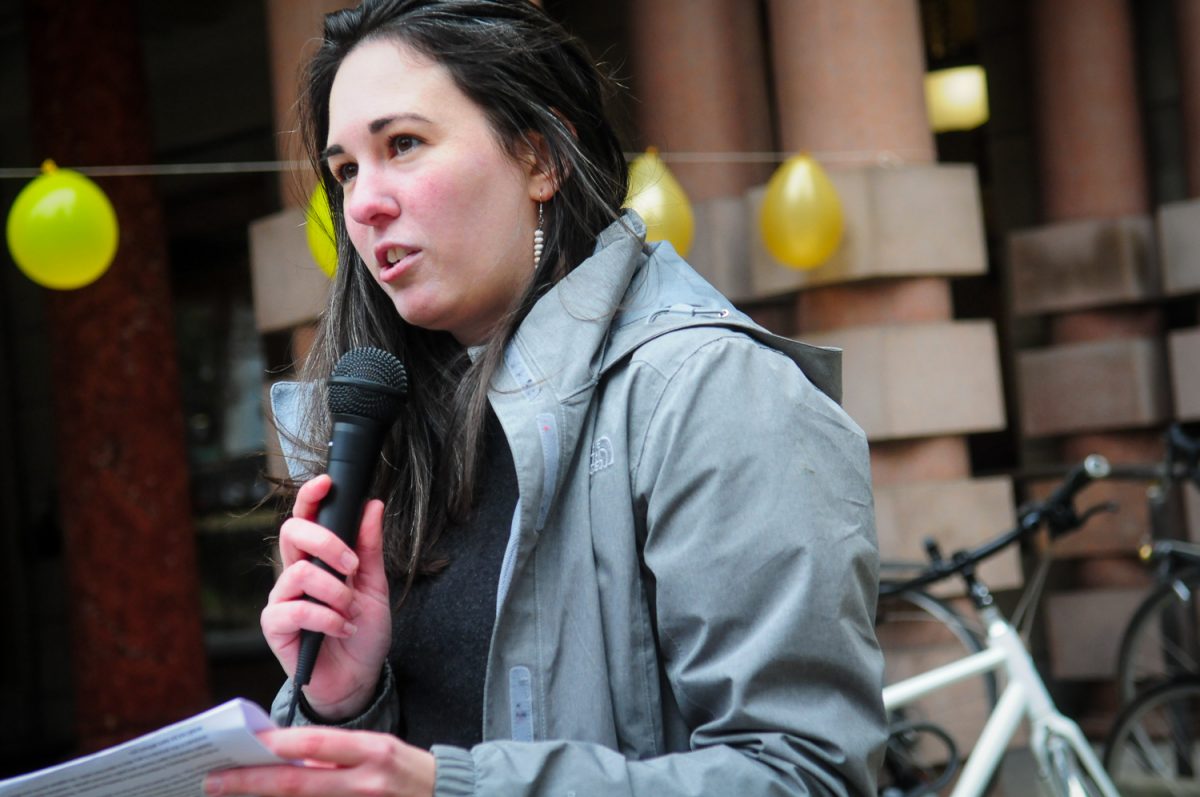
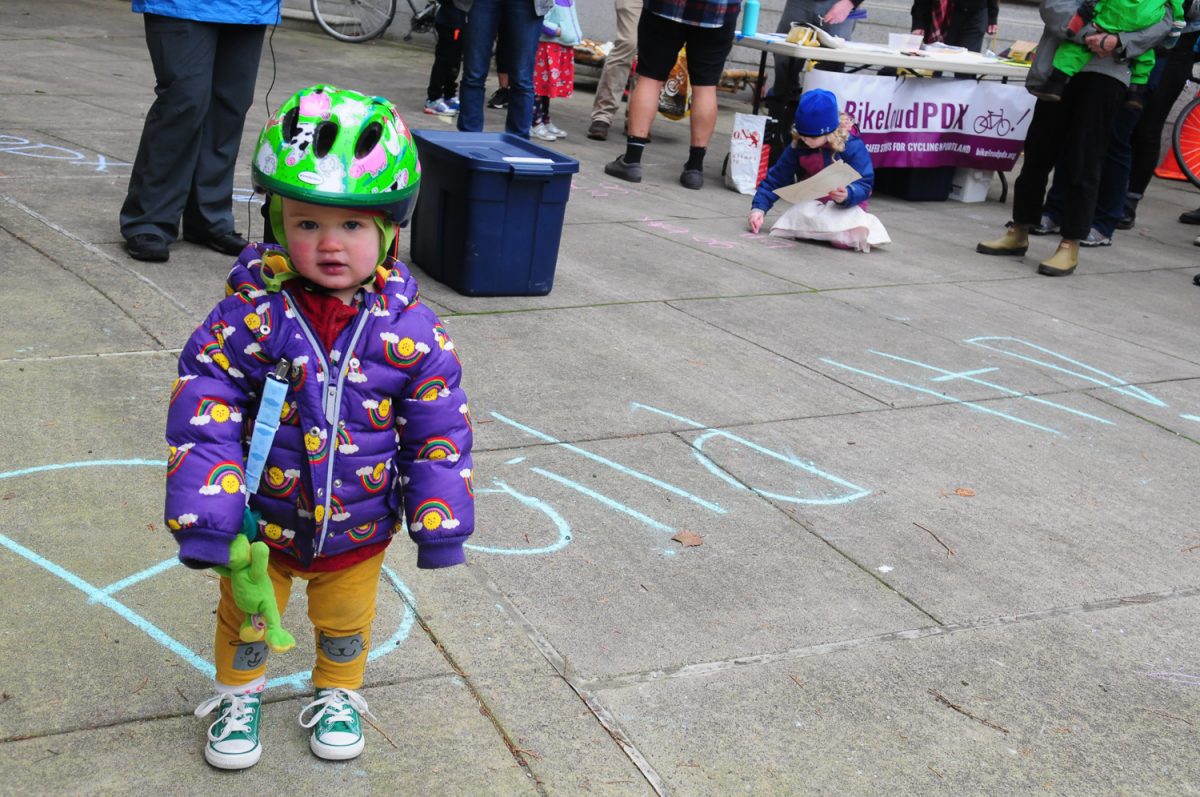
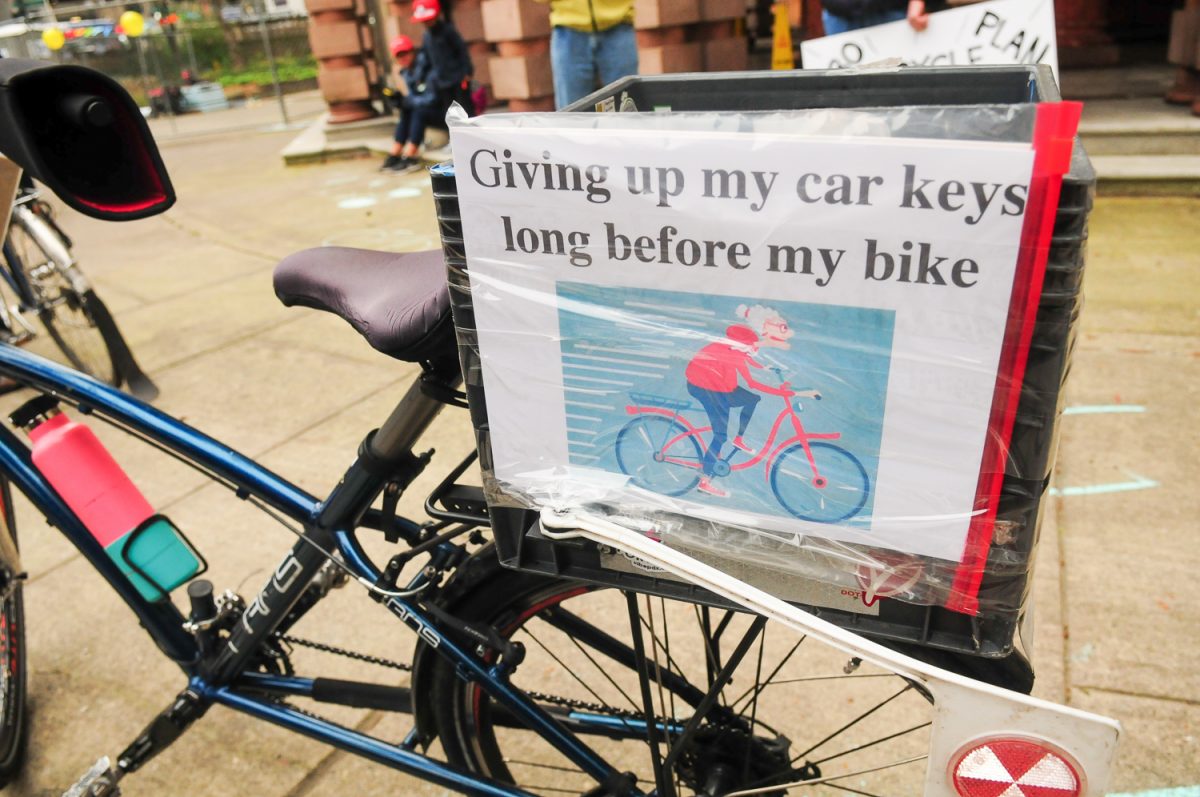
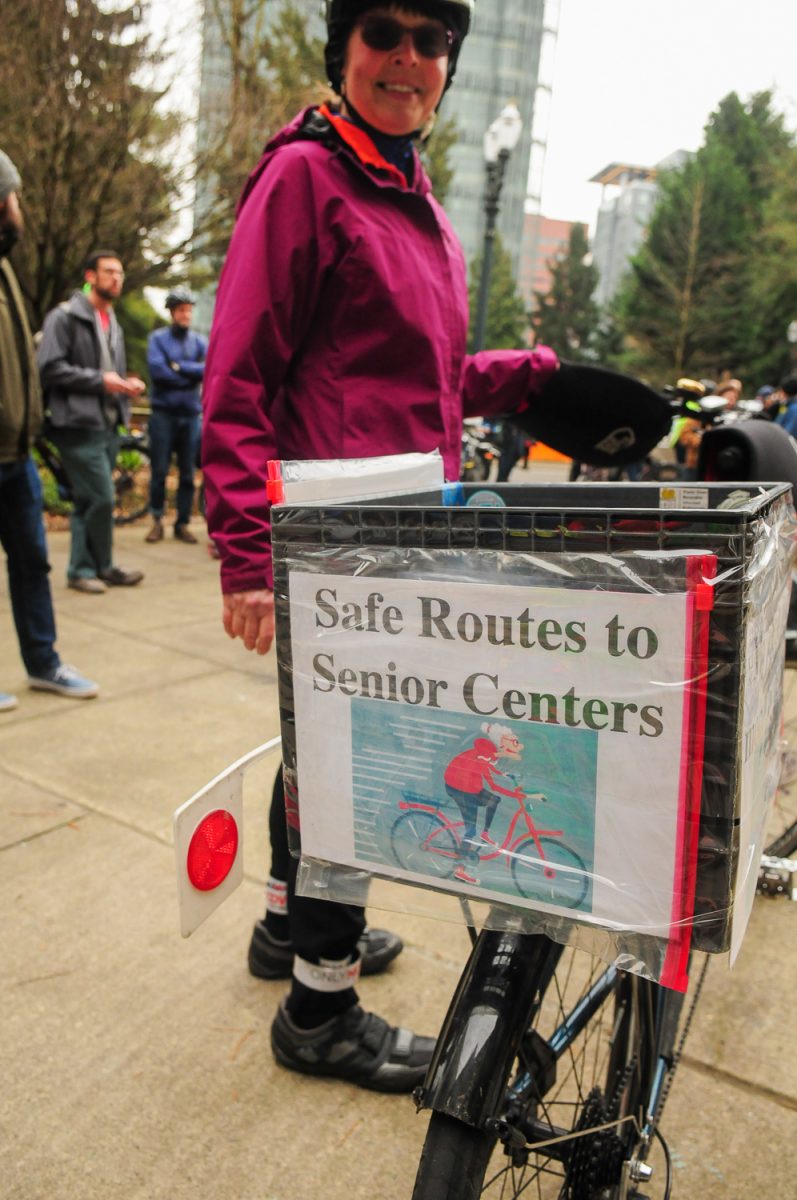


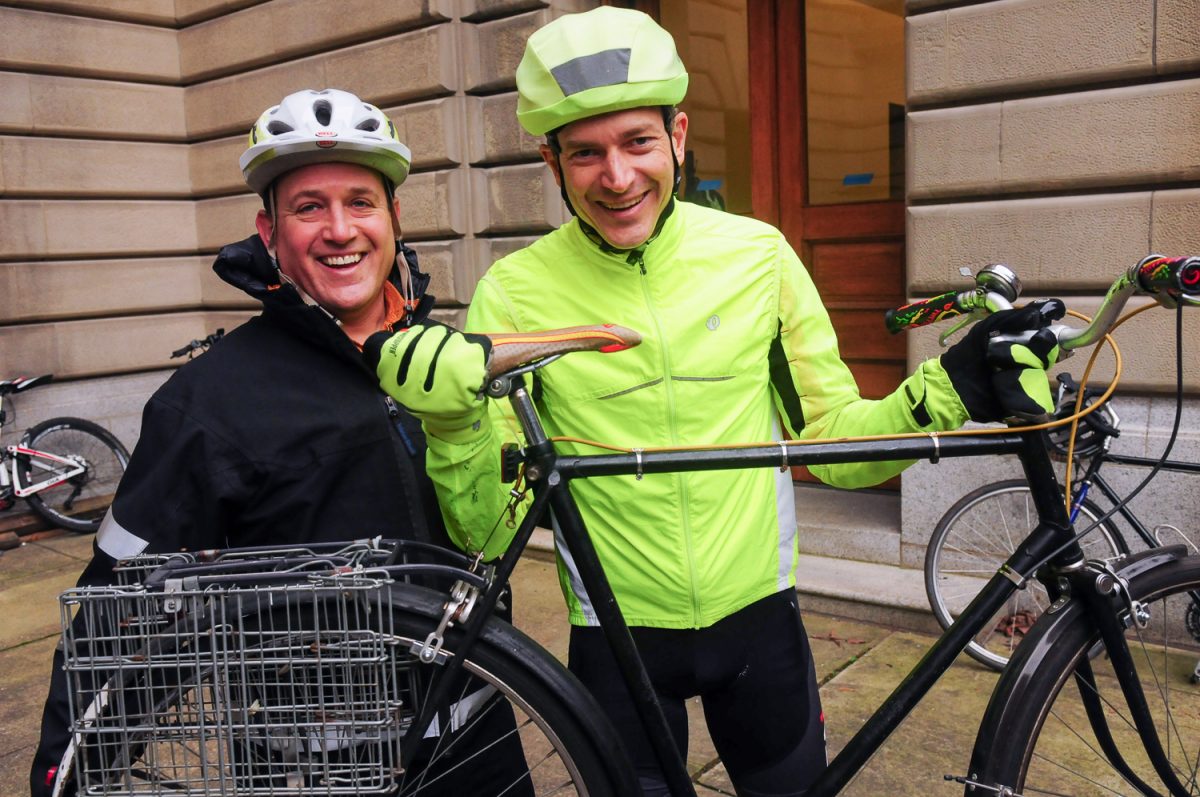

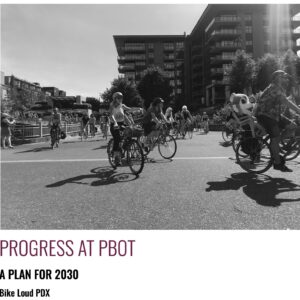
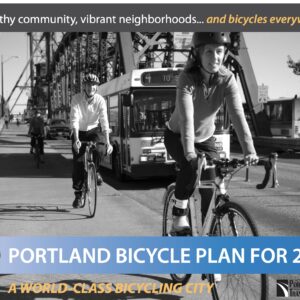
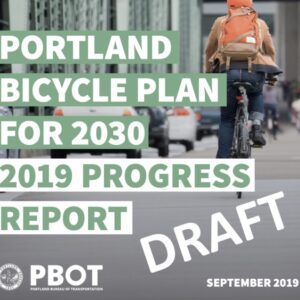
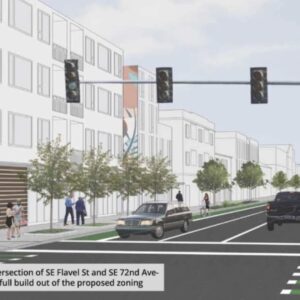
Thanks for reading.
BikePortland has served this community with independent community journalism since 2005. We rely on subscriptions from readers like you to survive. Your financial support is vital in keeping this valuable resource alive and well.
Please subscribe today to strengthen and expand our work.
What a great turnout! Especially impressed with the number of candidates who showed up. The torch for making Portland a great city to ride a bike is still burning.
It is up to our elected (or soon to be elected) officials to carry it into implementation.
“It is the year 2030, and Portland looks much different than it did a generation ago…”
It’s 2020 and everyone in the photo looks so white and well off, yet so many people in the rest of the city are homeless, poor, and/or racially diverse.
On the plus side, far fewer participants are wearing the ubiquitous neon yellow jackets of 2010.
Community Cycling Center Executive Director Kasandra Griffin addressed this in her remarks. If equity is where you want to focus, perhaps you want to promote and aid CCC. 🙂
I’ll tell you what I want. I want my NC community of 300,000 to build a good safe basic bicycle network, which is perfectly doable and affordable. In order to do that, we need a bit more money, but more important, we need the political will from our 9-person city council (5 white women, 3 black women, and one black man) and our city manager to re-prioritize local funding. They won’t do so as long as they think or perceive bicycling as a mode of transportation used exclusively by middle-class white people, in spite of the fact that the local census shows that most of our bicycle users are black. Everyone here looks to Portland Oregon as a medium-sized city that has effectively embraced bicycling, but as long as the images presented in the media (including Bike Portland) show that bicycling is still a predominantly middle-class white pursuit, they won’t budge. So what you do in Portland is important, but how you present yourselves to the wider world is even more important, and to our councilors, you guys are looking very white – which is ultimately hurting our bike community here.
IMO, the Bike Loud PDX report unintentionally further condemns the Portland bicycle community as being middle-class white by not citing the East Portland In Motion study of 2012 as well as its priority towards neighborhood greenways, both of which will hurt PBOT’s current policy of prioritizing projects lower-income communities of color. When the City Council passed the bike plan 2030, they specifically called out its lack of any standards for East Portland and Cully, let alone equitable standards. The EPIM was a direct reply to those concerns. Personally, I think the whole bike plan should be scrapped and the city start over with a clear equity lens, with an affordable plan for all residents.
” Personally, I think the whole bike plan should be scrapped and the city start over with a clear equity lens, with an affordable plan for all residents.”
Boom.
The perfect is the enemy of the good. We have a plan lets improve it not start over from the beginning. Aren’t people on here always saying we need this infrastructure now. If we start the planning over it’ll be the 2060 plan.
I would love to hear your thoughts on what a clearer equity lens means specifically. I’m not quite sure if you mean the stakeholders involved with drafting the plan, prioritization of projects, something else, or all the above. I’m not against scrapping the bike plan for a better strategy, I mentioned the idea to several people! But launching a multi-year process to reform the plan would need some very specific outcomes to be worth it.
EPIM projects had languished for a number of years but it seemed like many are getting built now or in the near future.
Please come back, David!
And run for office!
Folks, if you were unable to attend, but wish to make your support of the 2030 Bicycle Plan known, please email Commissioner Eudaly and share your feelings with her.
Chloe@portlandoregon.gov
Just a quick
“Dear Commissioner Eudaly,
“I ride a bicycle [frequency, location]
“I think we can do better! Please expedite completion of the 2030 Bicycle Master Plan
“Your constituent, _____”
The squeaky wheel gets the grease!
Ted Buehler
The fact of the matter is that PBOT and the city generally don’t actually care about reducing carbon consumption. Our state-wide leaders are expanding our interstate system, our local leaders are pushing regressive taxing measures that enable the well-heeled citizens of Portland to drive around on shiny new infrastructure while working class Portlanders face an ever increasing cost of living.
The 2030 bike plan was never more than fluff to try and keep sustainability activist quiet, and it mostly worked. PBOT gets to pretend to be a progressive city agency committed to fighting climate change and congestion, and the freight and petroleum industry continue to get a captured audience.
If PBOT wants to increase cyclist, it should focus on neighborhoods that are not currently connected to the grid. PBOT keeps pouring money in NW, where wealthy residents choose to drive their sub-3 mile commutes. Meanwhile residents in Parkrose have literally zero safe options to getting downtown or accessing other parts of the city. The bike activist culture is fundamentally flawed in that advocates tend to be wealthier and whiter than our community at large. Perhaps the BAC would get some diversity on it if it wasn’t held at 6pm on a weekday DOWNTOWN. How many working class Portlanders could get downtown by 6 on a Tuesday? How many working class Portlanders can attend a rally at noon on a Tuesday?
chm89, it seems like you agree with all the things Bike Loud is trying to advance. I mean isn’t improved access for Parkrose part of the 2030 plan?
I’m not a member of Bike Loud, but I’m very appreciative of their efforts. I also think it’s important to call out as constructively as possible the ways they can improve. But saying that Portland bike activism is “fundamentally flawed” because it isn’t pure and free of the classist and racist culture it’s trying to improve seems, well, toxic.
Reminds me of the “Mister Gotcha” cartoon by Matt Bors. https://thenib.com/mister-gotcha/
See also: JM’s personal principal of not downplaying other people’s advocacy efforts: https://bikeportland.org/2019/12/18/a-lower-speed-limit-on-st-johns-bridge-maybe-308939#div-comment-7247342
I didn’t get to the “birthday party” because I’m one of those people who can’t go to a mid-day event downtown because of work, but I’m truly grateful for those who directed whatever social privilege they had to making the event happen. It looks like it, and the larger effort to direct attention to the 2030 plan, could help move the needle.
I’m not even speaking about racism and class-ism in the bike activist scene. My point is that the voices that PBOT is “engaging” with are almost always, white, wealthy, and live close-in. How many members of the BAC live outside 82nd? 122nd? NW of Interstate? Better yet, how many member of PBOTs management live east of Gresham and west of 205? How many make under $25k a year?
The problem is that when you constantly “engage” with the same voices over and over again, voices that are not representative of the community, you end up focusing on their issues instead of the cities issues. The homogenous makeup of the bike activist community takes up space and allows PBOT management to pretend they are actually engaging the community, which is much more damaging than any good the same-old-faces are doing by flogging a plan that PBOT never intended to do in the first place.
Ah, I think I get it. So you see the whole thing as conversations between different groups of elites, and therefore tainted beyond repair. So you think the 2030 plan should be formally scrapped because it didn’t have the kind of representative input you’re describing?
I guess I’m still not getting what you think should PBOT and people in the speaking about racism and class-ism in the bike activist scene should actually *do*. I mean, do you have any examples of things done right by organizations like PBOT that you can point to as guide for action?
I hear what you’re saying about PBOT’s approach to engagement being broken, and I agree. (This is super-tangential, but when I read the Oregonian’s article about Mercy Corp’s “culture of niceness” contributing to its complete mishandling of sexual abuse allegations against its CEO, I thought that applied broadly to a lot of white professional culture preferring comfort over doing what what is ethical. https://www.oregonlive.com/pacific-northwest-news/2020/02/another-mercy-corps-executive-resigns-as-new-report-finds-bungling-of-sex-abuse-allegations.html)
Anyways, it seems like the Bike Loud folks also agree to some extent — They talk about it directly in their report (see “Challenge: Perceived Lack of Community Support”)
Though you say you’re not speaking about racism and classism in the bike activist scene, it does seem like your criticism isn’t just leveled at PBOT. I hear you saying that the folks in Bike Loud are blind enough to their privilege that they’re doing more harm than good. (I think of that blindness as a form of racism and classism, and that’s what I was referring to in my original comment.)
Here’s my thing: When I see pointing out of things falling short presented in the language of absolutism, combined with no substantive offering of ways to make it better, that’s a red flag. It’s a viewpoint partially informed by some readings that talk about how perfectionism and lack of appreciation is a core element of white supremacy culture. https://www.showingupforracialjustice.org/white-supremacy-culture-characteristics.html
My own position is that the 2030 plan is a good one, good enough that it’s the one we should be using to move swiftly towards getting the kind of infrastructure we need.
Why would I think that the 2030 plan should be scrapped? Are you reading what I’m writing or just projecting your assumptions on to me? My view on the 2030 bike plan is that PBOT never intended, and still doesn’t intend, to do much of any of it. I thought that when they passed it and I think time has proved me right. In another ten years we will a couple more projects done and we will be well on the way to planning the 2050 bike plan that PBOT can ignore.
It’s hard for me to point to other organizations because I don’t generally follow other cities department of transportation. PBOTs lack of engagement is evident in the quality and location of the work they produce.
And I’m sorry, I thought it was pretty clear what I thought activist and PBOT could do to make it better. Let make make it crystal clear. If PBOT wants more people to use bikes, they should stop engaging solely with white, wealthy, central city residents and instead focus on holding listening session in the more diverse, culturally and economically, parts of Portland to hear their needs and concerns and then, this is a big shocker, work to improve the infrastructure for people in live in those areas so that biking is reasonable. Is substantive enough for you?
Most of my criticism is pointed about the BAC and PBOT rather than BIkeLoud, I just don’t think BikeLoud will accomplish anything by focusing on a plan PBOT has no intention of doing.